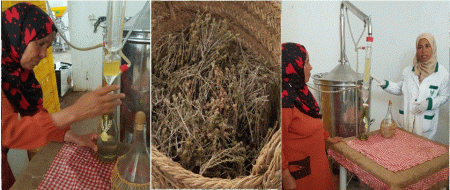
Objective:
Identify drivers and barriers for developing the Tunisian Essential Oil market and new growth strategies to promote the sector and become more competitive in the international market.
Context:
Tunisia is endowed with vast resources of aromatic plants, particularly rosemary and myrtle in forest areas. Apart from the traditional ways of using these plants, many are exported as essential oils to industrialized countries. These products represent significant export opportunities, however many constraints have limited Tunisian exports, largely related to the weakness of the value chain and supply. Indeed different sizes of firms are operating in the essential oils sector but with varying profitability indicators (small firms are facing various difficulties compared with large firms).
Contacts:
Ibtissem Taghouti, ibtissem.taghouti@gmail.com
Further information:
Taghouti, Ibtissem, and Hamed Daly-Hassen. "Essential oils value chain in Tunisian forests: Conflicts between inclusiveness and marketing performance." Arabian Journal of Medicinal and Aromatic Plants 4.2: 15-41.